- Home
- Christine Pope
All Fall Down Page 17
All Fall Down Read online
Page 17
“Such as?”
Did I dare to tell him the truth of my thoughts? But how could I do otherwise? I owed him honesty at least. “My lord, I cannot stay here.”
My reply appeared to surprise him. He shifted slightly, and stared down at me. “A few days ago you seemed determined to stay the winter,” he said, and I could discern nothing from his tone. “May I ask what has happened to change your feelings on this matter?”
“I have had time to think,” I replied simply.
“Think on what?”
The cold from the freezing stones on which I stood seemed to be working its way up my legs, leaching all warmth from me. I crossed my arms in a vain attempt to slow down the chill that threatened to overtake my entire body. “That I cannot hide here in safety when there are so many who need my help.”
He didn’t waste time asking me to explain myself. When he spoke, his tone sounded strangely gentle. “And do you sincerely believe you can make that much of a difference, one woman working alone?”
At his words I opened my mouth to protest, and he held up a hand, requesting my patience. “I do not mean to belittle your skill, Merys,” he said. “I of all people know how much healing you hold in those hands of yours. But how much good can two hands—even ones as skilled as yours—do against a great evil such as the plague?”
A question I had already asked myself, and one for which I had no ready answer. But still I replied, “More good than these two hands could do here, sitting idle.” Hoping I looked braver than I felt, I gazed up at him. The uneasy light in the courtyard rendered his familiar features almost unrecognizable. I might have been speaking to a stranger. Paradoxically, that notion gave me the courage to go on. “I swore an oath, my lord, an oath to tend the sick and the wounded, wherever they might be, and whatever illness they may be suffering. It is a very simple oath, actually, one which has no provisions that allow the healer to avoid his duties simply because he fears for his own life. This is a risk we all must take, we who swear our lives to the Order. I cannot abandon my vows now, just because the thought of what lies beyond these walls terrifies me.”
I fell silent then, wondering if I had said too much. Certainly it was the longest speech I could ever remember uttering in his presence.
For a moment he did not speak. Then he said, “You are an extraordinary woman, Merys.”
His words of praise brought the blood flooding to my cheeks, and I stammered, “Oh, no, my lord. That is—I do only what I have been sworn to do, what I know I must—”
“Are you contradicting me?” he inquired, and although the words might have been stern, I could tell from the amused tone of his voice they had not been intended that way.
“No, my lord,” I said meekly, and he laughed outright at my uncharacteristic humility.
“Enough of that,” he remarked. “So is there nothing I can say to dissuade you?”
There were many things I wished to hear him say, but I knew I did not have the courage to articulate any of them. I merely looked away from him, glad of the uncertain light.
“Well,” he said, then paused. “I will say them anyway, even if they do nothing to change your mind. Auren needs you. The people of Donnishold need you. Would you abandon them to their fate, to succor strangers who know nothing of you?”
The hope that had begun to blossom in my heart seemed to wither and die. What a fool I was, to think he had any regard for me save how I might serve him, serve the people I could tell he loved, even those who numbered among his slaves. Each word seemed like a barbed dart, causing agony with every syllable, driving home the knowledge that he meant far more to me than I did to him.
He watched me closely. No doubt he expected some sort of reply, but my tongue was a dead weight in my mouth, my throat dry. I cleared my throat.
“My lord—” I began, but a new voice interrupted me, saying,
“Mistress Merys!”
Gathering my ragged composure as best I could, I turned to see Wilys, the master of horse, approaching from within the keep. He had not been at supper, as far as I could recall, and so must have first gone inside looking for me.
I stepped away from Lord Shaine, who said nothing. But I could sense him standing there behind me. I could only hope that my face had not betrayed me, that he had not been able to read any of my disappointment from my expression. I was glad then of the poorly lit courtyard. Perhaps the shadows had sheltered me.
Somehow I forced my features into more placid lines and turned to Wilys. I managed to ask in Selddish, for I knew his grasp of the common tongue was shaky at best, “Is anything amiss?”
The gods only knew what he must have been thinking, to see me and his lord huddled in an obscure courner of the courtyard. But of course he would say nothing. A t any rate, whatever it might have looked like, the exchange between Lord Shaine and myself had been entirely innocent. Too innocent, unfortunately.
Wilys frowned. “Mistress, one of my stablehands has been taken ill. I need you to come look at him.”
“Of course,” I said immediately. This was, after all, my duty, and even if I had determined to leave Donnishold, I could not turn my back on someone who needed me here. This would delay my leave-taking, no more. A contemptible part of my mind hoped that the stableboy was quite ill, taken with an infection of the lungs or something else that would require me to stay for some days. Anything that would prevent me from having to say farewell to Donnishold and the man who had impossibly claimed my heart, even though I knew it was not mine to give.
I had thought myself well beyond such entanglements, but the gods had apparently deemed otherwise. I could not stop to marvel at their cruelty, however—I had someone who needed my assistance. “I need to fetch my supplies,” I said. “What are the sick boy’s....” And I trailed off, realizing I didn’t know the Selddish word for “symptom.” “How does he ail?” I finished lamely.
“Fever, and his breathing sounds bad, like a winded horse,” Wilys replied.
That could describe a number of things, unfortunately. Well, I would know for myself soon enough. “Wait for me,” I told him, then fled, not daring to meet Lord Shaine’s eyes.
As hastily as I could, I mounted the tower steps to my room. Elissa slept already, her face a pale blur in the dark chamber. By that time I knew the room’s layout so well I had no need of a candle; I merely knelt by my bed and pulled the satchel out from its hiding place underneath.
Auren met me at the bottom of the stairs, Larol’s family ranged behind her. They must have noted my precipitous dash up the tower’s stairs.
“Is something wrong?” she asked. Although she sounded calm, I could see the worry in her eyes.
“Nothing you need to trouble yourself with,” I replied, and uttered a silent prayer that my words were the truth. “One of the stablehands has fallen sick, and Master Wilys has asked me to look in on him.”
Auren still looked troubled, so I added, “It is the season for coughs and fevers, my lady. I find myself surprised that I haven’t been called in for such a thing ere this night.”
At my words, she nodded, and said, “This is true, mistress. Why, last winter we were all laid up with a fearful ague. I wish you had been with us then!”
I said, “Well, I am here now. But now I must go to attend this boy—”
“Of course,” she replied at once. “I did not mean to keep you.”
Her manner seemed almost too grave, too courteous, but I thought I knew the reason why—the disapproving Lady Yvaine stood only a few paces behind her, listening to our every word. No doubt she would be quick to note any misstep.
“No harm done, my lady,” I said, and gave her a reassuring smile. “It is your right to inquire as to the health of your household.” These last words I said in a slightly louder tone, so the Lady Yvaine could not help but hear them. I certainly did not envy Auren her future mother-in-law.
But after that I made a quick curtsey, then hurried back out to the courtyard, where Wilys and Lord Shai
ne both waited for me. Lord Shaine sent me one long searching glance before he nodded, then turned and went back inside the keep. How I wished I could have followed him. Instead, I nodded at Wilys, indicating that I was ready.
Without speaking, Wilys led me toward the stables. The slaves who worked there slept on the premises, in a small lean-to built up against the south side of the building. I supposed this was so they could be immediately on hand in case any of their charges should require special care during the night. For all their outward sturdiness, horses could be remarkably fragile creatures.
The stablehands numbered five, not counting Wilys, their master. The four boys who were not ill loitered in the stable proper, looking uneasy. I did not know them very well, as they spent the majority of their time in the stables or in the training yard, making sure all of Lord Shaine’s valuable property remained in top form. The red-haired one looked vaguely familiar, however, and I remembered that I had seen him in the hall during the Midwinter feast.
“In here, mistress,” said Wilys, and pushed aside the heavy leather curtain that served as a door for the stablehands’ quarters.
It was a mean, small room, crowded with too many bunks for the space. But the two lanterns which illuminated the place showed it was neat and reasonably clean, no small feat for a chamber shared by that many young men. I supposed that Wilys kept a close eye on all of them to make sure they did not dirty the room overmuch.
The sick boy lay on the bottom bunk nearest the door. I went to him immediately, kneeling down on the cold stone floor next to his bed.
He did look very bad, face pale and somehow sunken, a sheen of sweat covering his thin features. I heard immediately his rapid breathing, and began to run down a mental list of possible maladies. So many diseases presented first with fever, but for his breathing to be that labored, yet with no cough? Typhoid, possibly, in its early stages, but there had been no other cases on the estate that I had known of. Indeed, aside from the usual chills and bumps and bruises, Lord Shaine’s people were a remarkably healthy lot.
The boy muttered something I couldn’t quite make out, and I said in Selddish, “I am Mistress Merys, the healer. Can you understand me?”
“Hurts,” the boy said, and pushed at the rough blanket that covered him.
“Hurts where?” I asked. “Does your head hurt? Your chest?”
He shook his head, and grasped the blanket once more and shoved it off him. It was certainly not warm enough in there for him to do such thing, especially when wearing a thin linen tunic such as the one that covered his slender form, and I automatically reached out to cover him up once more.
“No!” he protested, attempting to slap at my hands. “Hurts there.”
The blow felt as if it had been delivered by a very small child, so weak was he. With a sigh, I folded the blanket back so that it would only cover him up to mid-thigh. Tenderness in the belly?
“Does your stomach hurt?” I asked, praying that perhaps he had merely ingested some food which had turned, or water gone bad from standing too long.
A feeble head shake. Then he pointed at his groin.
Trying to ignore the feeling of dread that began to tighten my throat, I grasped the edges of his tunic by my fingertips and lifted.
For a long moment I could only sit there and stare at the swelling in his groin, at the bruised lump that had distended and distorted the pale skin there. Some part of me wanted to stamp its feet and cry, It’s not fair! like a small child given a punishment she felt she did not deserve. Hadn’t I taken every precaution? Hadn’t I done everything in my power to ensure neither Brit nor I carried any trace of the disease?
All my cautions seemed to have to been for naught. Suddenly feeling unutterably weary, I replaced his tunic with as much care is I could, then rose to my feet. Wilys and the other stable boys watched me, fear already showing in their faces, although I had said nothing. Perhaps my own features had already betrayed me.
The plague had come to Donnishold.
Chapter 12
“He is very ill,” I said. Somehow my voice remained cool and calm, although I was neither of those things at the moment. “And I very much fear that some of you will be ill soon as well.”
“It is the plague?” asked Wilys.
I did not know the word itself in Selddish, but his meaning was clear enough. “Yes,” I replied.
The man’s face drained of all color, and the stableboys shifted and murmured amongst themselves, but at least none of them tried to bolt. So Wilys had that much control over them.
“You must all stay here,” I went on. If I focused on what to do next, perhaps I could keep a tight rein on the panic that had begun to coil in my belly like a restive snake. “I can’t do anything about the contact you’ve had with the other members of the household, but we absolutely must make sure no one else is exposed any more than they already have been.”
“How long?”
I admired him then, admired him for the stoic way in which he faced me—and his fate. I didn’t bother to ask him what he meant by the question. “Usually the first signs of illness appear within three or four days of exposure. Of course, I have no way of knowing how long it has been since each of you was exposed.” I swallowed, and wondered if the judges back in Lystare felt this way when they handed out a death sentence. Of course, in those cases one hoped the condemned man was guilty of the crime that demanded his life, whereas I knew Wilys and the young men—boys, really—who clustered around him were completely innocent. A deep breath, and I continued, “It will be much as it was with the stableboy here. A fever. Difficulty breathing. Swellings in the groin and armpits, and possibly the throat.”
“And then—until it is over?”
His voice shook somewhat, but Wilys broad, pleasant faced was resigned. And somehow that angered me, that he should think himself dead while he still lived and breathed.
“It may not be,” I told him, and an expression of surprise passed over his features. The stableboys looked at me askance. “I was too late for Lord Arnad’s people, but I am here for all of you now. There are things that can be done—even for him.” I gestured toward the limp form of their stricken comrade. “The important thing is for all of us to remain calm, and for you to remember that I have been trained in these things.”
Brave words. A few of the stableboys’ faces brightened a little as they appeared to take what I had said to heart. Wilys’ features remained stolid and unmoving, but he gave a little nod. Perhaps they believed me more than I believed myself. After all, they had seen me save both their master’s life and the life of his daughter. They knew I had stopped infections and eased coughs. Very likely they had no idea how pernicious a thing the plague was, and how, as it had lain dormant for so many centuries, I had no practical experience in how to treat it. I had read books and a few surviving accounts. I knew how to recognize the symptoms, and I knew of a few measures, such as lancing the plague boils to release the infection inside. But all of that counted for very little in the long run. I knew that some of the people watching me at that moment would die, and most likely many of the people who lingered inside Lord Shaine’s keep, still blissfully unaware of the doom that had fallen on us all.
Not him. Dear gods, I can bear it if at least I don’t lose him.
Immediately I was ashamed that such a thought had even passed through my mind. I was here to help everyone, not just the man I had come to love.
“I need you all to think of whom you’ve had contact with, and tell me their names,” I went on. “I will pass word along that those people will need to be separated as well. I’ll ask Lord Shaine to turn the larger of the dye huts into a—” I stumbled for a second or two as I realized I didn’t know the Selddish word for “quarantine”…if indeed there even was one, “—a place where people can be kept apart from the others.”
The stableboys began whispering amongst themselves, and produced far fewer names than I had expected. Perhaps that wasn’t so odd; they did tend to be
isolated out here away from the main keep. Still, the list was long enough, and included half of the men-at-arms, as well as most of the kitchen staff. Wilys repeated many of the same names, but added Master Breen to the count, and my heart sank a little. The falcon master did not always take his supper in the great hall with the family, but he had been there often enough that there was a chance they had all been exposed.
Flushing furiously, the eldest of the stableboys said he’d also seen Irinna, one of the young women who worked among the dyers.
“Seen her?” jeered one of his comrades. “Funny way of putting it. Stuck your tongue down her throat, more like.”
The stableboy turned even brighter red, and I sighed mentally. So I would have to add this Irinna and her companions in the dye hut to the list of possibly exposed people. At this rate, there would be very few in the stronghold who wouldn’t be under a cloud of contagion.
A knock came against the doorframe of the stablehands’ sleeping quarters. I heard Ourrel’s voice say, “Mistress Merys?”
“Don’t come in!” I called out. At once I went to the door, but I opened it only a crack. “Stand back, Ourrel. The plague is here.”
Silence. Then, “Gods help us.”
“Let us hope they can,” I said crisply. “Tell Lord Shaine one of the stableboys is ill, and I have no doubt that the rest of them have been exposed. And I as well, so I will have to remain here.”
I could not see Ourrel’s face, but there was no mistaking the slight tremor in his normally deep, calm voice. “Of course, Mistress. How may I be of service?”
“I’ll need my satchel, and some changes of clothing—Elissa can see to that.” I paused. “Perhaps you should fetch something to write with. I have a list of people who may also have been exposed.”
“No need for that, mistress. Just tell me.”
Then I recalled the times I had seen him working with Lord Shaine, when Ourrel could tally up long lists of sums in his head and somehow keep track of his master’s requests and instructions without ever having to take notes or write down pieces of information. A handy skill. “Very well,” I told him. “Here they are.” And I rattled off the names, and said a quarantine area should be set up.

 Magic in the Desert: Three Paranormal Romance Series Starters Set in the American Southwest
Magic in the Desert: Three Paranormal Romance Series Starters Set in the American Southwest Grave Mistake
Grave Mistake Unbroken Vows
Unbroken Vows Darker Paths (The Witches of Canyon Road Book 2)
Darker Paths (The Witches of Canyon Road Book 2) The Song of the Thrush
The Song of the Thrush Hidden Gifts (The Witches of Canyon Road Book 1)
Hidden Gifts (The Witches of Canyon Road Book 1) Unholy Ground
Unholy Ground Storm Born
Storm Born Unquiet Souls
Unquiet Souls An Ill Wind
An Ill Wind Demon Born
Demon Born Mysterious Ways
Mysterious Ways Haunted Hearts
Haunted Hearts A Canyon Road Christmas
A Canyon Road Christmas Darknight (The Witches of Cleopatra Hill Book 2)
Darknight (The Witches of Cleopatra Hill Book 2) Threads of Gold (Tales of the Latter Kingdoms Book 6)
Threads of Gold (Tales of the Latter Kingdoms Book 6) The Witches of Canyon Road, Books 1-3
The Witches of Canyon Road, Books 1-3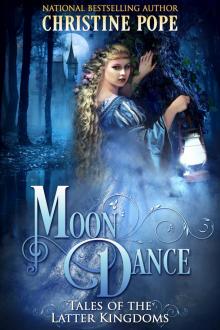 tales of the latter kingdom 08 - moon dance
tales of the latter kingdom 08 - moon dance Stolen and Seduced
Stolen and Seduced Winds of Change
Winds of Change Bad Vibrations: Book 1 of the Sedona Files
Bad Vibrations: Book 1 of the Sedona Files gaian consortium 05 - the titan trap
gaian consortium 05 - the titan trap Unbound Spirits
Unbound Spirits sedona files 05 - falling angels
sedona files 05 - falling angels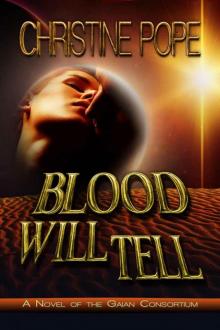 Blood Will Tell
Blood Will Tell Breath of Life
Breath of Life djinn wars 03 - fallen
djinn wars 03 - fallen Unmarked Graves
Unmarked Graves All Fall Down
All Fall Down djinn wars 01 - chosen
djinn wars 01 - chosen Defender (The Witches of Cleopatra Hill Book 11)
Defender (The Witches of Cleopatra Hill Book 11) The Wolf of Harrow Hall (Tales of the Latter Kingdoms Book 7)
The Wolf of Harrow Hall (Tales of the Latter Kingdoms Book 7) sedona files - books one to three
sedona files - books one to three The Arrangement (The Witches of Cleopatra Hill Book 10)
The Arrangement (The Witches of Cleopatra Hill Book 10)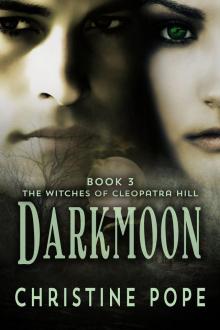 Darkmoon (The Witches of Cleopatra Hill Book 3)
Darkmoon (The Witches of Cleopatra Hill Book 3) Playing With Fire
Playing With Fire djinn wars 02 - taken
djinn wars 02 - taken Falling Dark
Falling Dark witches of cleopatra hill 04.5 - cleopatra hill christmas
witches of cleopatra hill 04.5 - cleopatra hill christmas Deep Magic
Deep Magic witches of cleopatra hill 07 - impractical magic
witches of cleopatra hill 07 - impractical magic Demons & Djinn: Nine Paranormal Romance and Urban Fantasy Novels Featuring Demons, Djinn, and other Bad Boys of the Underworld
Demons & Djinn: Nine Paranormal Romance and Urban Fantasy Novels Featuring Demons, Djinn, and other Bad Boys of the Underworld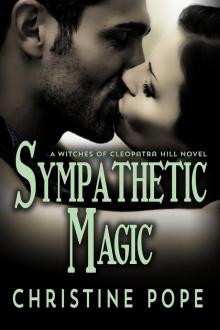 Sympathetic Magic (The Witches of Cleopatra Hill Book 4)
Sympathetic Magic (The Witches of Cleopatra Hill Book 4) Sympathy for the Devil
Sympathy for the Devil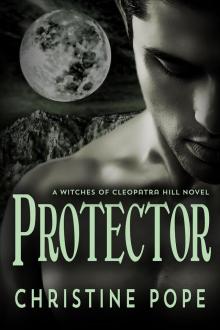 Protector (The Witches of Cleopatra Hill Book 5)
Protector (The Witches of Cleopatra Hill Book 5) Darktide
Darktide Strange Magic (The Witches of Cleopatra Hill Book 9)
Strange Magic (The Witches of Cleopatra Hill Book 9) Forbidden (The Djinn Wars Book 6)
Forbidden (The Djinn Wars Book 6) sedona files 06 - enemy mine
sedona files 06 - enemy mine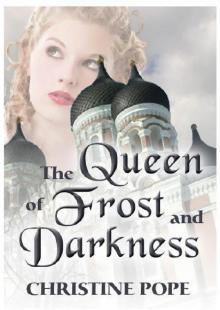 The Queen of Frost and Darkness
The Queen of Frost and Darkness Fringe Benefits
Fringe Benefits Forsaken (The Djinn Wars Book 5)
Forsaken (The Djinn Wars Book 5) Illuminated
Illuminated The Mandala Maneuver
The Mandala Maneuver Deep Magic (The Witches of Cleopatra Hill Book 13)
Deep Magic (The Witches of Cleopatra Hill Book 13) Awoken
Awoken Darkangel (The Witches of Cleopatra Hill)
Darkangel (The Witches of Cleopatra Hill)